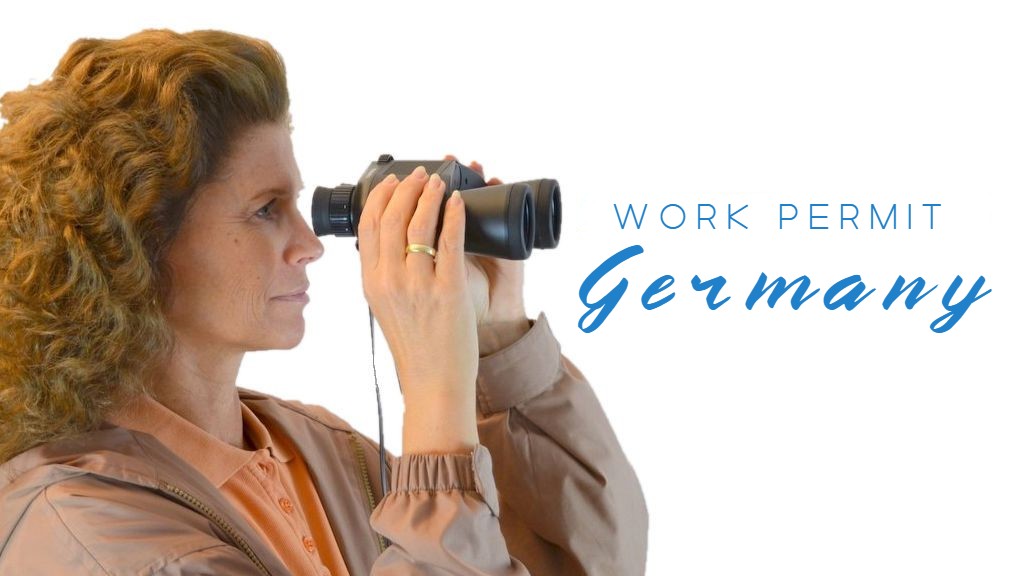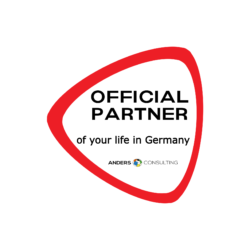Application of a work permit and a Blue Card EU – Germany is calling!
Your first step towards working & living in Germany: the work permit. And what is a Blue card anyway?
If a human resources manager is faced with the question of whether a newly hired or seconded employee with the nationality of a third country may work in Germany and thus obtain a visa or a residence title, he or she should start with the question of access to the German labor market – with the work permit.
The process towards the residence title can start by using the standard procedure at the embassy or optionally employing the accelerated procedure for skilled workers (“beschleunigtes Fachkräfteverfahren”). The Blue Card EU can also be obtained using the accelerated procedure.
The work permit is formally an approval by the German Labor Office, but there are also cases where the approval is not required. The Blue Card EU is one of them. The details are regulated by the Employment Ordinance (“Beschäftigungsverordnung”, BeschV) and the Residence Act (“Aufenthaltsgesetz”, AufenthG). In case of doubt, we will support you in assessing whether access to the German labor market is possible even before you start planning an employment. If the access is denied, employment is not possible.
With the work permit in your hands the door to Germany is wide open
Companies should be aware that a violation is regarded as illegal employment and that according to the Skilled Workers Immigration Act (“Fachkräfteeinwanderungsgesetz”) there is an obligation to check whether there is a valid residence permit and to document this. It cannot be said often enough: A Schengen Visa (3-month or B visa) or a business visa does not entitle the holder to work in Germany!
Our support also focuses on the question of an employer of how quickly you can expect the employee in question to be able to start his duties. In many cases this happens faster than you think, if you know all the tricks of the trade. So, of course, we will help you decide whether to use the standard procedure or the accelerated skilled worker procedure (“Beschleunigtes Fachkräfteverfahren”).
Once the employee has a work permit, the biggest hurdle is overcome. The employer and not the employee submits the application to the German Labor Office. The most important factors are the employment contract and its conditions, the actual position and the qualification along with its recognition in Germany. But be careful: The statement of the German Labor Office is valid for 6 months only. So if the appointment at the embassy is too far in the future, then it becomes invalid before and must be obtained again by the embassy, which can delay the procedure for quite some time.
As of March 1, 2020, the so-called priority check (“Vorrangprüfung”), in which the employment agency checks whether a German or EU worker would be preferentially available for the position, will no longer be applyed. Even jobs that are not shortage occupations are now approvable in the commercial sector if a recognition of the degree or education can be obtained.
We offer assistance to recruiters, personnel consultants, companies from small to large – including start-ups – and also to employees as private clients. You don’t have to assign to a whole relocation package to us; we are happy to assist you in applying for a work permit only. You are guaranteed to save a lot of time and hassle.
The service list for the work permit shows you which steps the support includes. Legal note: We do not provide legal services within the scope of our activities.
Make your life easier by using professional assistance to obtain your general work permit or Blue Card EU
“Not all activities in Germany require a work permit. Exemptions: 1. The settlement permit to highly qualified persons according to § 19 of the Residence Act (“Aufenthaltsgesetz, AufenthG”), 2. Blue Card EU (§ 2 “Beschäftigungsverordnung”, BeschV), 3. Employment of executive employees with general power of attorney or procuration or of members of the governing body of a legal entity who are entitled to legal representation (§3 BeschV) and 4. Employment of scientific personnel at universities and of visiting scientists (§5 BeschV).
However, it is always important that the respective professional qualification is recognized. The requirement that the recognized qualification qualifies the holder to work in that particular position in Germany has been dropped since November 2023. Now an engineer can work in human resources.
Qualifications acquired in Germany in at least a 2-year training period or an university degrees work best. However, qualifications acquired abroad are also accepted if they are recognized in Germany. Concerning university degrees you can easily check the “anabin” database, for other professional qualifications you have to go through a recognition procedure or provide a confirmation of equivalence.
The services of Anders Consulting for work permits are easy to use, fast and inexpensive. We are not allowed to provide legal services, but this is not necessary except in exceptional cases. This means that you need support, but not by a specialist lawyer and certainly not by a special visa agency with an international reputation costing you a fortune. And you have no idea how many international visa agencies end up turning to us because they can’t do it any better, more effectively or more cheaply. Why not knocking on our door in the first place?
In the Immigration Center in Hamburg, which I manage, we reliably process hundreds of applications for work permits every year. Thus we have some routine and are in constant contact with the employment agency. We quickly resolve problems with the authorities over the phone.
And if you want to prepare for the embassy appointment after the receipt of your work permit pre-consent, need support with the registration at the place of residence and the application for the long-term residence permit, we are there for you at any time. And if, at the end of the day, you also need help finding an apartment or settling-in with your family, you will always find what you need by using one of our countless destination services. You’ve got a Friend in Germany!”
What you need to know about the EU Blue Card
The EU Blue Card is the implementation of the EU Highly Qualified Persons Directive for the immigration and labor migration of non-EU foreigners with academic qualifications to the EU. The implementation was the responsibility of the individual states of the EU. The German design and conditions can be found in the Residence Act (“Aufenthaltsgesetz”, AufenthG).
In 2022, almost 40.000 highly qualified persons started working in Germany with the EU Blue Card, often called “Blue Card” only (source; Federal Office for Migration and Refugees, “Bundesamt für Migration und Flüchtline”, BAMF). Almost one third of all the applicants came from India. Professionals from China, Russia, Turkey and Brazil followed the ranking at some distance.
The corresponding residence title is limited to a maximum of 4 years – or the duration of the temporary employment plus 3 months – and requires a recognized and equivalent university degree. The recognition can be checked in “anabin”, the database of the Conference of Ministers of Education and Cultural Affairs (“Kultusministerkonferenz”). If the degree is not listed in “anabin”, you can apply for recognition at the Central Office for Foreign Education (“Zentralstelle für ausländisches Bildungswesen”, ZAB). However, this can take many weeks or several months. An express procedure is now available as of 2024.
Furthermore, an employment contract or a irrevocable job offer must be available. The minimum gross annual salary is 43.800,00 Euro (2024). For STEM professions and bottleneck occuoations, a lower lower limit of 39.682,80 Euro applies.
Those wishing to apply for an EU Blue Card from abroad can clarify whether they meet the requirements by means of a preliminary inquiry for a pre-consent at the Central Foreign and Specialist Placement Office of the German Labor Office (“Zentrale Auslands- und Fachvermittlung der Agentur für Arbeit”, ZAV). However, the ZAV does not have to give its formal approval. On the other hand, anyone who applies for a Blue Card in Germany, e.g. after completing a course of study, cannot make a preliminary inquiry. In such cases, the competent immigration authority will ask the ZAV internally.
Anyone who has worked for 33 months as a highly qualified person with the Blue Card EU can obtain a permanent settlement permit (“Niederlassungserlaubnis”), provided that they have paid all the compulsory social security contributions and meet other requirements at the same time. *Those who can prove that they have already reached level B1 in the German language after 21 months can receive the settlement permit even earlier. The “Niederlassungserlaubnis” is a title for permanent residence.
Download the current price list and plan your relocation to Germany
10 interesting facts about obtaining a residence permit in Germany
1. According to the Employment Ordinance (“Beschäftigungsverordnung”, BeschV), only those foreigners who require a residence permit in Germany (“Non-EU” citizens) and who must therefore be separately permitted to take up an employment require also a work permit.
2. The Employment Ordinance (BeschV) deals with the following occupational groups and activities, among many others: skilled workers, highly qualified workers, executives, scientists, academics, au pairs, interns, seasonal workers, showmen’s assistants, domestic helpers, employees on secondment (expats), persons for the performance of work supply contracts, driving personnel in international road and rail transport, artists, actors, professional athletes, photo models, dressmen, tour guides, interpreters, crew personnel in shipping and air transport, etc.
3. Citizens of EU member states, citizens of Iceland, Liechtenstein, Norway and Switzerland as well as their spouses and children are not subject to the Employment Ordinance, although the latter are third country citizens.
4. Each work permit is primarily tied to the fact that the employee earns a comparable salary to a German in the same job in the respective region. The employment agency is very careful to ensure that no “cheap labor” enters the country. Applications that do not show the target salary will be rigorously rejected.
5. As an employer, you should already make sure in the recruitment process that there will no problems with the work permit later on. In case of doubt, contact Anders Consulting before the actual hiring, so that there are no problems, or they are solved “in a creative manner” in advance.
6. The so-called priority check (“Vorrangprüfung”) will no longer be applied as of March 1, 2020 within the framework of the entry into force of the Skilled Workers Immigration Act (“Fachkräfteeinwanderungsgesetz”). The definition of a shortage occupation will also no longer exist. It is replaced by bottleneck occupation but is only connecet to lower income minimum targets. However, anyone who hopes that this will now allow any employee from a third country to come to Germany is mistaken. Comparable salary (no wage dumping), qualification as a specialist together with a professional recognition (reference qualification) and German language skills remain the main criteria.
7. Even without a recognized qualification that qualifies for a specific job profile, it is possible to obtain a work permit. For this, however, one must be a skilled worker and demonstrably be a professional specialist for the job description in the advertisement. A great deal of expertise is often required to convincingly present the facts of the case to the employment agency.
8. An acceleration of the visa procedure is achieved by the so-called pre-consent (work permit): Not the German embassy asks the employment agency for the work permit, but the applicant already submits the work permit in his or her visa appointment. This significantly shortens the processing time at the embassy. But be careful: The work permit is only valid for 6 months from the date of issue!
9. Whether you are still inexperienced but employing an employee from a third country for the first time or you are an international company applying for work permits on an ongoing basis and would like to outsource this process, the Immigration Center of Anders Consulting in Hamburg has the right solution for you.
10. Anders Consulting offers the complete support package including application for the work permit, preparation of the embassy appointment, registration after entry and application for the long-term residence permit for significantly less than 1.500,00 Euro**. Feel free to compare with other providers. **Not including state fees.
Errors and omissions excepted. Does not replace legal advice. Status: Spring 2024.
Service list for obtaining a work permit for general employment or a Blue Card EU
Fixed Price 625,00 Euro plus VAT
*** Additional Immigration Services ***
Fixed Price Single 410,00 Euro plus VAT
Fixed Price per additional person 60,00 Euro plus VAT
Fixed Price Single 320,00 Euro plus VAT
Fixed Price per additional person 60,00 Euro plus VAT
Photo: (c) Anders Consulting using Fotolia file: #127389862 | Copyright: Web Buttons Inc.




